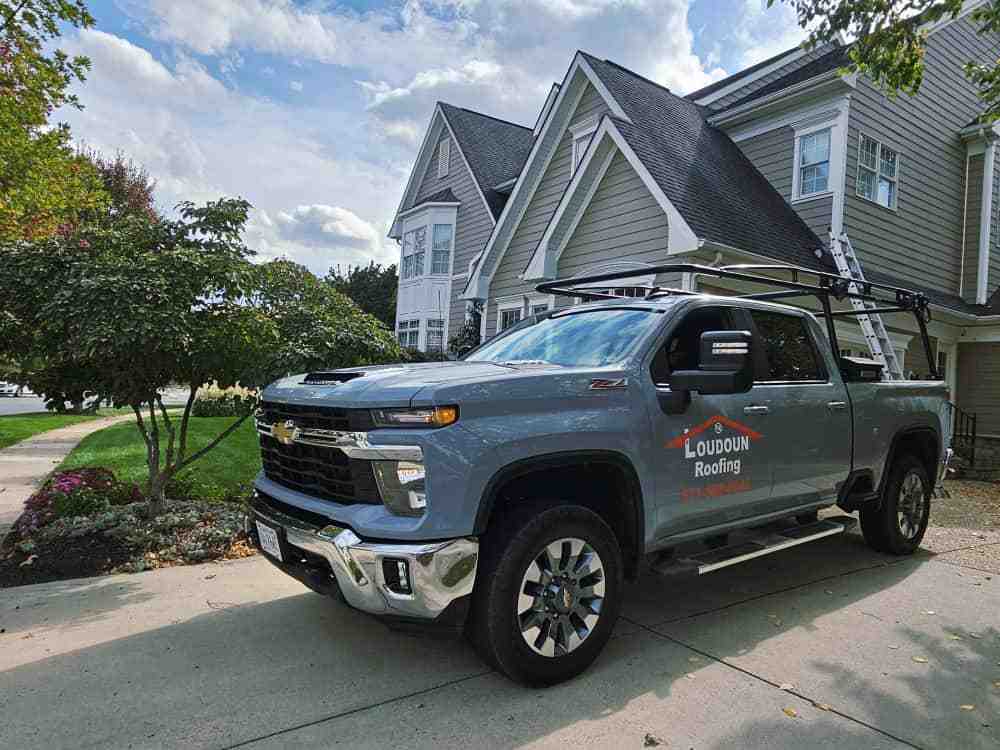Your Roof is Your Home’s First Line of Defense
When you need to find a roofer, you’re making a critical decision for your home’s protection. Your roof is the primary shield for your biggest investment, so whether you’re dealing with storm damage or an aging roof, choosing the right professional is crucial. For trusted, local expertise and a full range of services, start with a team dedicated to your peace of mind.
Quick Steps to Find a Reliable Roofer:
- Get referrals from friends, family, and neighbors
- Check manufacturer directories (GAF, CertainTeed, IKO)
- Verify credentials – license, insurance, and certifications
- Read online reviews on Google, BBB, and Angi
- Get 3+ detailed quotes for comparison
- Review contracts carefully before signing
- Understand warranties (both manufacturer and workmanship)
Finding the right contractor shouldn’t be overwhelming. As Esteban Marin, owner of Loudoun Roofing & Home Improvement with over two decades of experience, I’ve helped countless Northern Virginia homeowners find a roofer they can trust. This guide outlines the exact process I recommend to ensure you choose a contractor who delivers quality workmanship and stands behind their work.
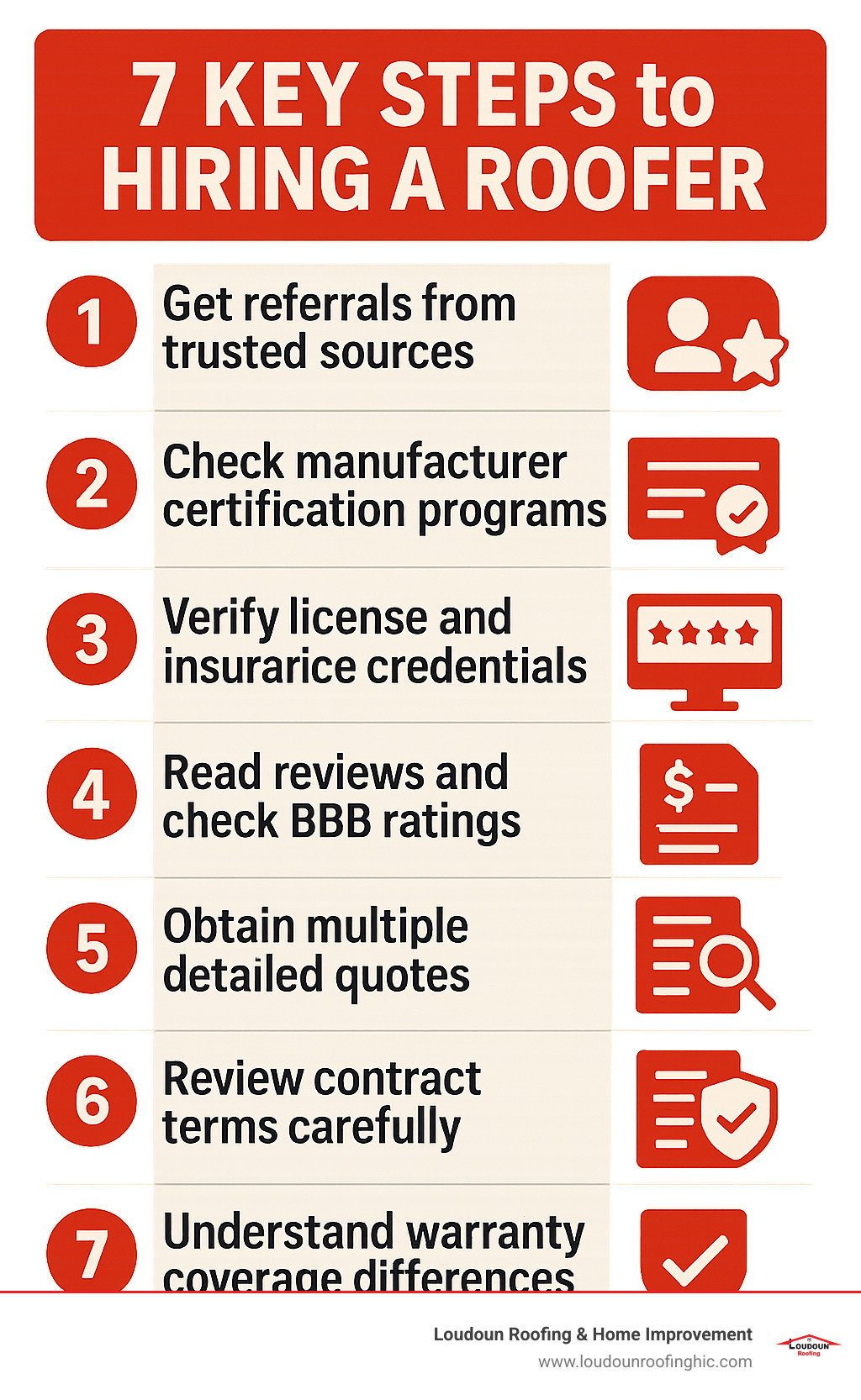
Find a roofer word roundup:
Step 1: How to Find a Roofer You Can Trust
When you need to find a roofer, the first challenge is knowing where to look. The key is starting with reliable sources and working through a systematic search. Your roof stands between your family and the elements, so taking the time to find a contractor through trusted channels is one of the smartest investments you can make.
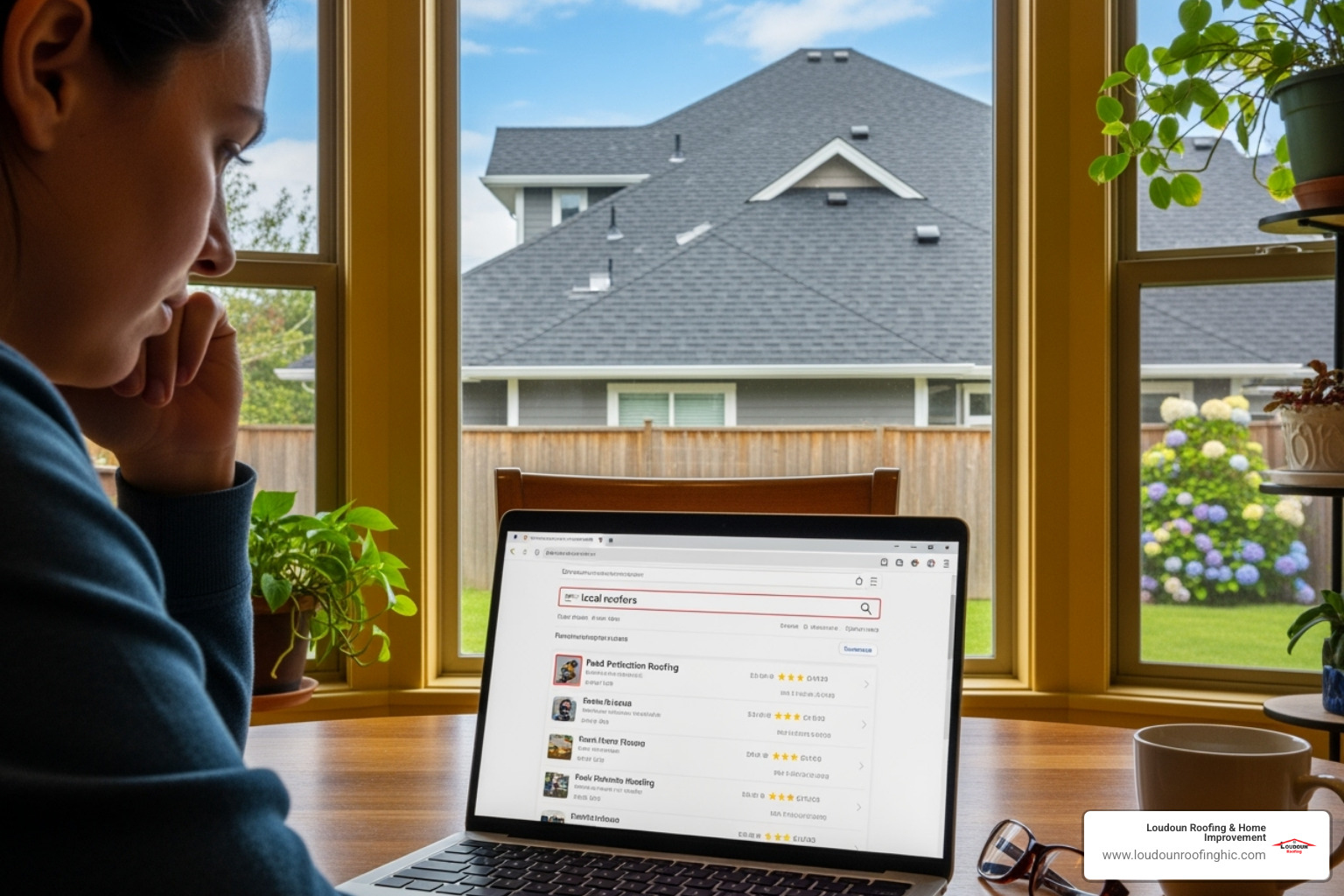
Where to Start Your Search to Find a Roofer
Start with people you trust. Friends, family, and neighbors can offer accounts of a contractor’s communication, timeliness, and cleanup. These personal experiences are invaluable.
Manufacturer certification programs are another excellent resource. Companies like GAF, Owens Corning, and IKO maintain directories of contractors who meet their training standards. Certified roofers often provide better warranties and use the latest installation techniques.
The Better Business Bureau is a vital research tool. Check ratings, read complaint histories, and see how companies resolve problems. Look for BBB Accredited businesses, as they’ve committed to higher ethical standards. You can find BBB Accredited roofing contractors near you through their directory.
Local hardware stores and online review platforms like Google or Angi can also provide leads, but always research these businesses independently. Look for patterns across multiple reviews rather than focusing on single comments.
Reading Between the Lines: What to Look for in Reviews and on Websites
Once you have a list of potential contractors, it’s time to investigate. A company’s online presence reveals a lot about its operations.
- Portfolio of Past Work: Reputable contractors proudly showcase completed projects. Look for consistent quality and variety.
- Physical Business Address: A physical location, not just a P.O. Box, suggests stability and accountability.
- Years in Business: Established businesses have a proven track record of weathering economic shifts and building lasting customer relationships.
- Clear Service Descriptions: Professional contractors clearly explain their services. Vague language is a red flag.
- Handling of Negative Reviews: Look for professional and proactive responses to complaints. How a company handles criticism is telling.
- Responsiveness: If a company is hard to reach during the sales process, imagine the difficulty if problems arise later.
For more insights into our background and commitment to quality, check out more info about our company.
Step 2: Vetting Your Roofer—The Non-Negotiable Credentials
After compiling a list of potential contractors, it’s time for the most critical step: verifying their credentials. This isn’t about being overly cautious; it’s about being smart. A legitimate roofing professional will readily provide documentation. Evasiveness is a major red flag.
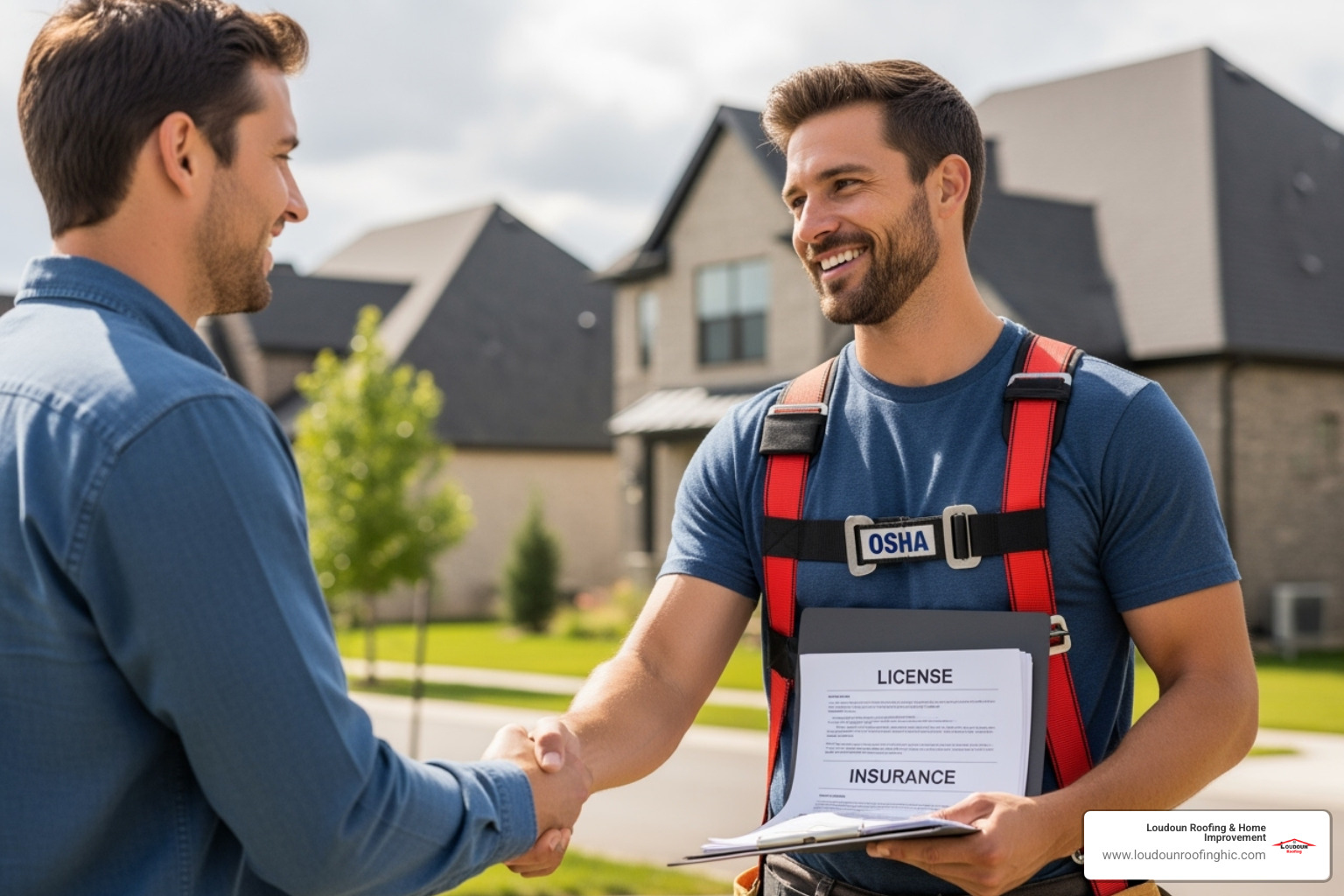
Confirming Licenses and Insurance
When you find a roofer, checking their licensing and insurance is your protection against liability for accidents, injuries, or property damage.
-
State and Local Licensing: In Virginia, roofing contractors must be licensed through the Department of Professional and Occupational Regulation (DPOR). This ensures they have met standards for competency and financial stability. Always ask for their license number and verify it independently.
-
General Liability Insurance: This protects you from costs related to property damage during the project. Without it, you could be responsible for repairs.
-
Worker’s Compensation Insurance: This is crucial. It protects you from lawsuits if a worker is injured on your property. Without it, you could face significant legal and medical expenses.
Don’t just take their word for it. Ask for current certificates of insurance and call the provider to confirm the policy is active. You can also find BBB Accredited roofing contractors near you who meet these standards.
The Importance of Manufacturer Certifications
Beyond basic credentials, manufacturer certifications represent the gold standard in roofing. These are earned credentials that show a commitment to excellence.
-
Access to Better Materials: Certified contractors often get first access to innovative products and advanced technologies, like GAF’s Timberline HDZ® shingles.
-
Improved Warranties: Manufacturers often offer improved system warranties exclusively through their certified installers. These can cover both materials and workmanship for extended periods.
-
Proper Installation Training: To maintain certification, crews must complete ongoing education on installation best practices and new products, which translates to better workmanship on your roof.
Look for these certifications when you find a roofer. They demonstrate a contractor’s dedication to quality. We maintain certifications with leading manufacturers, which you can learn about on our Roofing Brands We Trust page.
Step 3: Getting Quotes and Understanding the Contract
You’ve done your homework and checked credentials. Now it’s time to get quotes and understand exactly what you’re signing up for. This stage is critical to your project’s success.

Why You Should Always Get at Least Three Estimates
Never settle for a single quote. Getting at least three detailed estimates is essential for protecting yourself and your budget.
Multiple quotes help you compare prices and understand what’s reasonable for your market. The quoting process is also an opportunity to assess a contractor’s professionalism. Do they show up on time? Is their inspection thorough? Do they provide a detailed, written estimate? These interactions preview your working relationship.
Comparing quotes also helps you spot red flags. If one bid is dramatically lower than others, it often means corners will be cut. You’re looking for the best value, not just the lowest price. The cheapest option can become the most expensive in the long run. We encourage you to get a Free Roof Estimate from us and compare it with others.
Decoding the Contract: What Must Be Included
Once you choose a contractor, the contract is your project roadmap. It should be detailed and clear, leaving no room for confusion or surprise charges.
- Company Information: Full name, address, and contact info should match their license and insurance.
- Detailed Scope of Work: This should be a step-by-step manual, including tear-off details, underlayment type, ventilation plans, and cleanup procedures like a magnet sweep for nails.
- Specific Materials: The contract must list exact brand names, types, and colors (e.g., “GAF Timberline HDZ architectural shingles in Charcoal”).
- Payment Schedule: This should be clearly outlined. Be wary of demands for large upfront payments (more than 10-20% is a red flag).
- Warranty Details: Both workmanship and manufacturer warranties should be specified, including coverage, duration, and conditions.
- Lien Release Clause: This protects you if the main contractor fails to pay subcontractors or suppliers.
- Change Order Procedure: A clear process for handling unforeseen issues, like rotten decking, prevents disputes and surprise costs.
Take your time reviewing the contract and ask questions. A reputable contractor will welcome your thoroughness.
Step 4: Protecting Your Investment with Warranties and Scam Awareness
When you find a roofer and invest in a new roof, you want assurance that your investment is protected. This comes from understanding warranties and being alert to common roofing scams.
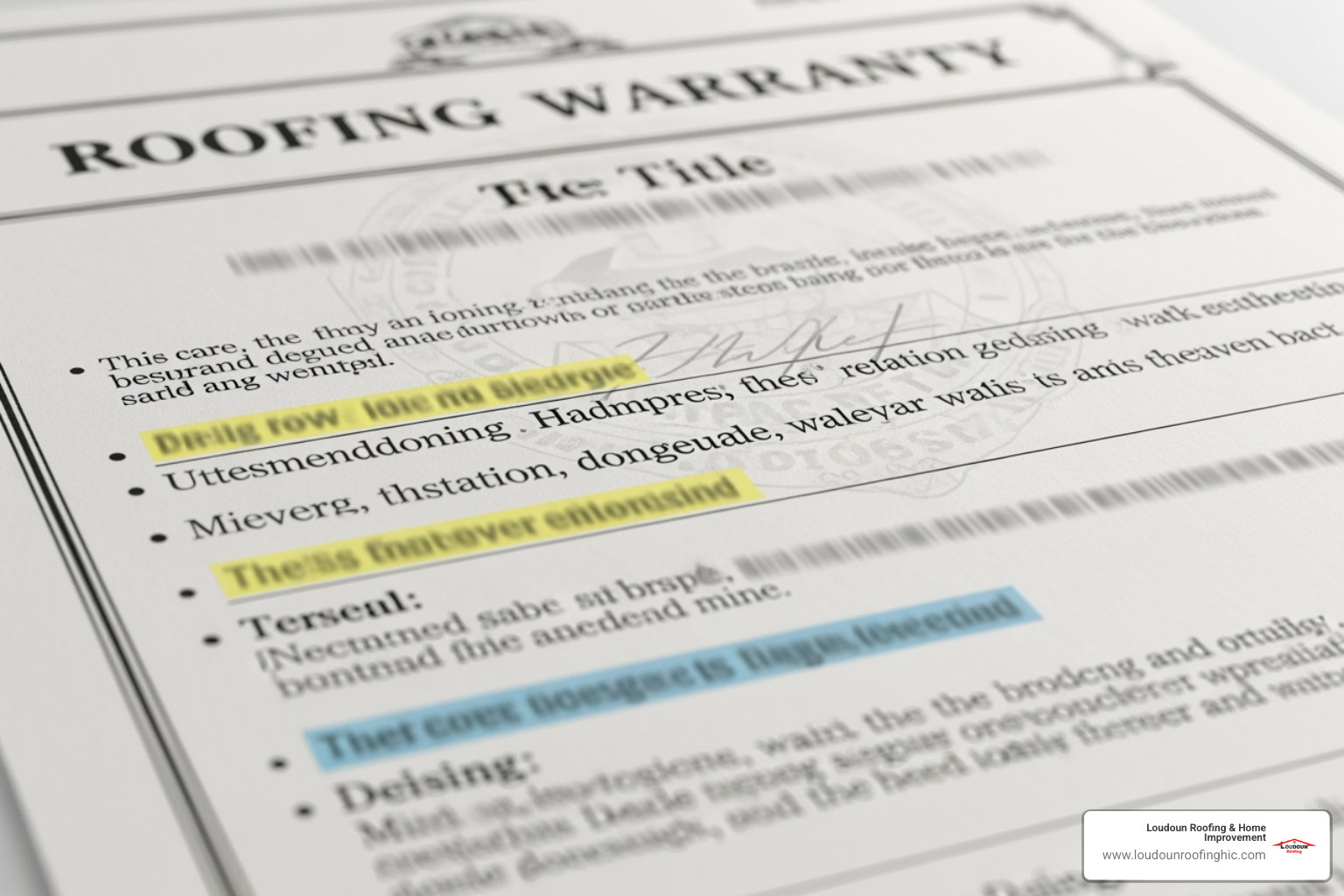
Manufacturer vs. Workmanship Warranty: Know the Difference
Not all roofing warranties are the same. You receive two different types of protection, and understanding both is essential.
| Feature | Manufacturer Warranty | Workmanship Warranty |
|---|---|---|
| Coverage | Defects in the roofing materials themselves | Installation errors or failures caused by improper workmanship |
| Provider | The shingle or material manufacturer (e.g., GAF, Owens Corning) | The roofing contractor who performed the installation |
| Duration | Varies (often 20-50 years, often prorated after initial years) | Varies (typically 1-10 years, though some reputable contractors offer longer) |
| What it Protects | The shingles, underlayment, and other system components from manufacturing defects | Leaks, blow-offs, or other issues directly resulting from how the roof was installed |
The manufacturer warranty covers defective materials. The workmanship warranty is your protection against installation errors. Even the best materials can fail if installed incorrectly. A trustworthy contractor will offer both and stand behind their work. Ensure both warranties are clearly detailed in your contract.
Common Roofing Scams and How to Avoid Them
Roofing scams are common, especially after storms. Scammers prey on homeowners’ stress with fear and pressure tactics. Here are red flags to watch for:
- “Storm Chasers”: These out-of-state contractors appear after a storm, do shoddy work, and disappear. They often lack proper local licensing.
- Large Upfront Payments: A reasonable deposit (10-20%) is standard. Be suspicious of anyone demanding most or all of the money before work begins.
- High-Pressure Sales Tactics: Reputable contractors give you time to review proposals. Walk away from “today only” deals.
- Unsolicited Door-to-Door Offers: Use extreme caution, especially after storms. Always research any company independently.
The best protection is working with established local contractors who have a reputation to maintain. If you have storm damage, take time to find a trusted local expert rather than the first person who knocks on your door.
Step 5: Know When to Call a Pro: Roof Health and Damage Assessment
Your roof works tirelessly to protect your home. Knowing when to find a roofer for professional help can prevent small issues from becoming expensive disasters. Think of it like a regular health checkup—catching problems early saves money and stress.
Telltale Signs Your Roof Needs Repair or Replacement
Your roof will show signs when it’s struggling. A typical asphalt shingle roof lasts 20-25 years, but watch for these red flags:
- Missing or Cracked Shingles: This exposes the underlayment to the elements, which can lead to faster deterioration.
- Buckling or Curling Shingles: These are signs that the shingles are past their lifespan and are no longer shedding water effectively.
- Granules in Gutters: These granules are the protective layer of your shingles. Finding a large amount in your gutters means your shingles are aging and becoming vulnerable.
- Water Spots on Ceilings or Walls: This is a clear sign of a leak. Address it immediately to prevent hidden damage like mold or rot.
- Sagging Roofline: If you notice any sagging, it could indicate a structural problem that requires immediate professional attention.
- Roof Age: If your roof is approaching its expected lifespan, it’s wise to have it inspected even if it looks fine from the ground.
When you spot any of these signs, it’s time for an expert to assess whether you need a simple repair or a full replacement.
Simple Maintenance to Extend Your Roof’s Life
A few simple tasks can add years to your roof’s life and prevent major headaches:
- Keep Gutters Clean: Clogged gutters cause water to back up, leading to rot and ice dams. Clean them at least twice a year.
- Trim Overhanging Branches: Branches can scrape shingles and drop debris into gutters. Keeping them trimmed reduces wear and tear.
- Check Flashing: Periodically inspect the metal strips around chimneys, skylights, and vents for cracks or rust, as these are common leak spots.
- Inspect Your Attic After Storms: Look for water stains or drips. Catching leaks from the inside is often easier and prevents damage to your living spaces.
While these DIY tasks help, nothing replaces professional expertise. Routine maintenance from an experienced roofer can identify subtle issues you might miss.
Frequently Asked Questions about Finding a Roofer
When it’s time to find a roofer, homeowners have many questions. This is a major home investment, and you want to get it right. Here are concise answers to the questions we hear most often.
How much does a new roof cost?
Roofing costs vary significantly based on several factors. Any contractor who gives you a price without a thorough inspection is not trustworthy.
- Size and Pitch: Larger, steeper roofs require more materials and labor, increasing the cost.
- Material Choice: Asphalt shingles (20-25 year lifespan) are budget-friendly. Metal, tile, or slate cost more upfront but often last longer.
- Labor Costs: These vary by region and project complexity.
- Old Roof Removal: Tearing off the old roof and disposing of the debris adds to the total cost.
- Underlying Repairs: Rotten decking or structural issues finded during the project can add to the cost but are critical to fix.
Minor repairs can range from $350 to $1,000, while a full replacement is a significant investment. Always get multiple, detailed quotes to compare the scope of work and pricing.
What should I do if my roof is damaged in a storm?
Storm damage is stressful, but a clear plan helps.
- Prioritize Safety: If there’s major structural damage or active leaks, ensure your family is safe.
- Document Everything: Take photos and videos of all damage, inside and out, before any temporary repairs. This is crucial for your insurance claim.
- Contact Your Insurer: Report the claim as soon as possible to start the process.
- Call a Reputable Local Roofer: Get a professional inspection and estimate to ensure your insurance claim is comprehensive. Avoid signing with storm chasers who appear at your door immediately after a storm. Take your time to vet a reliable, local contractor.
How do I find a roofer with the best value?
True value is the sweet spot between quality, durability, and cost—not just the lowest price. The cheapest bid often leads to expensive problems later.
- Quality Materials: High-grade materials from leading manufacturers last longer and perform better.
- Workmanship Warranty: A strong warranty shows a contractor’s confidence in their installation work. Ask what it covers and how claims are handled.
- Reputation: A company with a long local history and positive reviews has a proven track record of delivering quality.
- Professionalism: Clear communication and respect for your property are signs of a contractor who will make the process smoother and handle any issues professionally.
A well-installed roof from a reputable company saves you money over time by preventing premature failures and costly interior damage.
Conclusion: Making the Right Choice for Your Home
Choosing the right roofer is about protecting what matters most. Your roof shields your family and your biggest financial investment. When you find a roofer who understands this responsibility, you’re partnering with someone committed to your peace of mind.
This guide has walked you through the essential steps: getting trusted referrals, verifying credentials, understanding contracts, and avoiding scams. Due diligence today prevents headaches tomorrow. A quality roof is a long-term investment in your family’s security.
For homeowners throughout Leesburg, Ashburn, Sterling, South Riding, Purcellville, Lovettsville, Round Hill, Aldie, Hamilton, Middleburg, Waterford, Great Falls, McLean, Reston, Chantilly, Dulles, Bluemont, Winchester, Loudoun County, and the broader Northern Virginia region, finding a contractor who embodies quality, integrity, and customer satisfaction is key.
At Loudoun Roofing & Home Improvement, we’ve built our reputation on delivering durable, expertly crafted roofing solutions. We understand that inviting contractors to your home requires trust, and we work hard to earn it through transparent communication and superior workmanship.
Ready to move forward with confidence? Learn more about our comprehensive roof replacement process, where we guide you every step of the way.


